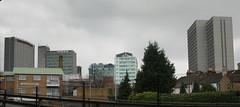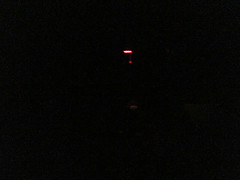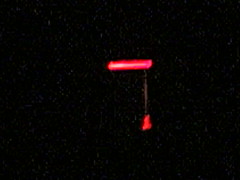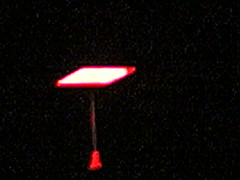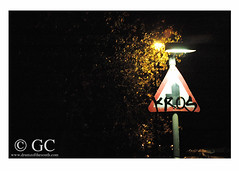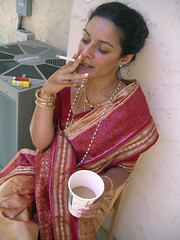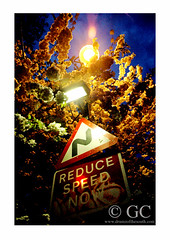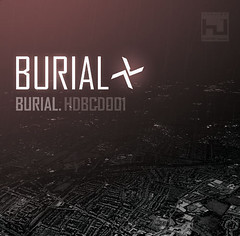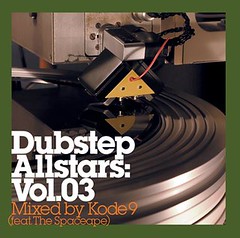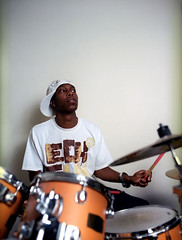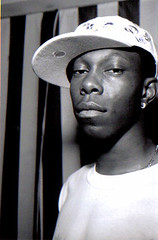Monday, June 12, 2006
Tuesday, June 06, 2006
Saturday, June 03, 2006
Tuesday, May 30, 2006
Which manor?
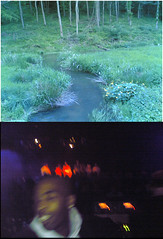
The Manor, originally shot inna citizen journalism stylee on his phone, edited and uploaded by Blackdown.
I was out of London over the weekend. I love this intense, pressured, multicultural city but sometimes escaping is good for the soul; for mine at least.
Driving through twisty rural lanes, the hedgerows bursting with prima vera, I was struck how odd the usually familiar recording of Roll Deep on Rinse felt. With JME hosting and Maximum dropping choice vocal cuts to begin with, even familiar bars jarred.
Now I know I’ve banged on about the link between environment and music, surrounding and sound, a lot – keysounds and all that – but internally I keep coming back to it since its proven such a profound revelation to me.
Its baffling how the same recording of JME and friends can sound sick in the car to FWD>>, cruising down dark, damp east London side streets, yet jar like an uppercut to the jawside while out in the sticks?
To add to the experience jungle/d&b made more sense again. On the same CD as the Rinse recording is a copy of Bailey’s recent ‘All Photek’ mix. I’ve never really recovered from Photek, if truth be told, even in the light of r&b and grime’s subsequent elegant rhythmic consolidations. More is more when it comes to Photek’s beats, unlike for me Squarepusher/Boxcutter/Amon Tobin/breakcore/all infinite Amen edits crew et al.
As well as Photek’s early jungle, Calibre’s recent d&b album finally made more sense cruising through fields at sunset than it had done in London. One of the key sonic signatures that differentiates d&b from much of grime or dubstep, is that spacious ‘e’ vibe. Synthetic synth pad washes that soar through your brain like the rushes of MDMA. Inherited from hardcore and acid house, d&b has yet to lose this vibe, whereas dubstep and grime reflect more fully the grounded ‘control culture,’ where raving is about being seen to be in-control, not lost, out of it, a trait that’s reinforced by the lack e sonic signatures in urban sounds like r’n’b, dancehall and desi and the culture of the rewind: if the track’s so unbearably good it might, just might make you lose control, well “quick rudeboy you mus lick dat back.”
To me it was this ‘space’ in the Calibre album that made some more sense surrounded by fields, not closed in by decaying buildings. The Calibre album is also pretty clean (caused perhaps from his upgrade from a shitty hardware sampler to Logic), so maybe that makes more sense when your lungs are full of fresh clean air, not pollution and tube dust.
Perhaps it’s a leap, but maybe this is why d&b has travelled, whereas in relative terms grime hasn’t? Of course I’m not comparing like with like: the music industry is massively different from the mid-90s to mid-00s (no way would producers – not artists – like Photek, Alex Reece and Goldie get signed to majors in this day and age) but perhaps one element of the reason could be that e-fuelled inclusive ‘unity’ at the centre of acid house has mass appeal, regardless of people’s urban, suburban or rural backgrounds. Conversely it’s harder to ‘get’ grime’s inner city anger unless you’ve walked through it a few times. (To qualify this, I’m not saying isolated rural yet determined headz can’t ‘get’ grime, I’m merely talking about scale: why aren’t legions of fans demanding to see grime MCs at Homelands (a dance festival held in a green rural bowl) or putting on their shows in medium sized count(r)y towns? For a full State of Grime nation debate go read the Dissensus thread…)
Later last weekend I found myself in a tiny rural village. One road in, one road out. Gorgeous wooded valley, no mobile reception. One stone church, two babbling brooks, one stately home (no, not that manor), few deer: the lot. Bar a few satellite dishes, I doubt the general appearance of the village had changed in decades, perhaps even centuries.
It would have been hard to find a more picture postcard vision of classical ‘Englishness.’ It’s the kind of lifestyle right wing newspapers expend a huge amount of energy defending. It’s the kind of setting left wing newspapers spend a huge amount of time eulogising in twaddly novels or indulgent arty ‘think pieces.’ And standing there it’s hard not to appreciate the lush beauty of it. Those kinds of places are the very definition of England as a ‘green and pleasant land.’
The problem for me isn’t with the place itself, it is with the place in contrast to others.
Take the concept of ‘Englishness.’ Yes these villages are in many ways the definition of ‘Englishness,’ but perhaps it’s an Englishness as it was. Personally I’m more interested in a more modern, multicultural vision of UK identity. A racially integrated, equal opportunity society – rural, suburban and urban.
It makes total sense that people who immigrate to the UK, and those who are born to parents who’ve immigrated, live in cities. At least communities can form, clustered around the few who share a common background with you. The problem is that perhaps this means the cities become increasingly more concentrated with people from multiracial backgrounds, and the countryside gets less so. The gap widens, the differences grow, the intolerance and misunderstandings increase and where does that leave the future of multiracial UK?
As any good scientist will tell you, you can’t make a trend out of a single data point… but here goes.
So I walk into the pub in this quintessential ‘old English’ village. It’s made of stone, the doors are about 5’ high, it sells funny named ales and they’ve got a beer festival on during England’s world cup games with amusingly named local bands. It’s old mans pub-tastic.
Where’s the old git chewing straw then? Oooh arrr.
Two details however, suggest a little bit of hope for a multicultural, modern Britain. One is that there’s a black family having a pint in the beer garden. At this point I’d suggest a gag in a yokel accent about ‘yer not from round ‘ere are you,’ but I sincerely hope they were. Two: guess what are the old gits at the bar talking about? Dodgy home brew? Fishing? How things aren’t what they used to be, oh no, that’s for sure?
Nope. They’re talking about the dangers of flipping eBay addiction, that’s what.
After four days surrounded by greenery so damn green it looked like it was on steroids, or some kind of mutant crack/compost, I returned to London. As the first familiar houses rose up around the car and the sense of ‘space’ contracted, I’m not quite sure, but I swear I felt that pressure return. Home sweet home, as Kano would say.
Tuesday, May 09, 2006
Saturday, May 06, 2006
Flickr desi dive and beyond...
Flickr: it's a such beautiful thing.
When the blogs and forums ain't doing it for me, I Fickr-dive; just add a tag like 'desi', 'Iraq' or 'hackney' into the search box on the homepage and just fall deep into into new worlds and people's lives. I find places I will probably never visit and see people I will probably never meet, yet experience them both in such vivid technicolour and in such a rich way - unlike the experiences of say reading a thousand empty one-line responses on forums or scanning the fractured image shards displayed search engine results.
The image above has no real connection to this post, beyond the fact that I instantly felt strongly about it while searching for the tag 'desi.' Coming home on the tube last night the carriage went overground just as I clicked on a 1Xtra radio rip of Bikram Singh ft Gunjan "Kawan (Jay Dhabi Reggaeton Remix)". Her vocals exploded into my ears as the sun poured over greater London and I felt a rush, that buzz I hadn't felt in a long time - perhaps since Mala's FWD>> set. Its felt like recently I've spent a long time listening to empty angry grime, second rate token cod-reggae dubstep and soulless dark, halfstep wannabe-Youngsta material - and it's not moving me.
On the point of digidub it's perhaps interesting to revisit Jamie Vex'd prophetic comments last year at grimemusic.com.
"...with dubstep, if it isnt halfstep, isnt minimal, and doesnt have blatant dub referenes, then some say its not true dubstep. How restrictive is that? Real dub is very organic, digital sequencers aren't. It takes alot of understanding and studio technique to go down the dub route. Without that knowledge, you can end up making Digidub. Im not in that."
Jamie OTM. It's not like I don't like real Jamaican dub, but as he says unless you understand how its done right it sounds cheesy. Drum & bass last year was full of hundreds of tracks that threw reggae samples over any beat and they sounded so token. And even if you were to get the sound right, how can cloning something made 30 years ago be better or more original than the original itself? Sure it gets a response on the dancefloor but mostly it's a creative cul-de-sac, unless you can add a fresh, original twist in the way the Mystikz can. To me applying the sonic ideas of 1970s dub to a 2006 dubstep context is a far more promising direction than sampling Lee Perry's back cat.
And as for dark empty halfstep, I guess I feel impulsively right now that I want more vocals in my life - I'm planning a new Keysound Radio: vocals edition. Part of me fears the dubstep pendulum has swung too far towards dark halfstep and is in danger of homogenising the scene. Dubstep does not equal bad clones of Loefah or copies of Youngsta's selection - don't get it twisted. Loe seriously knows what he's doing when it comes to minimalism; his clones don't. And furthermore what's the point of cloning anyway? Do you think Loe built 'Horror Show' by copying other producers? Find your own way.
But returning to desi, or more specifically desiton - the mutation of UK Asian desi with Latin American reggaeton - I posted a link on Dissensus about the Punjabi Hit Squad's pioneering of this sound. Since then I recorded the two stand out tunes last week. They are:
Bikram Singh ft Gunjan "Kawan (Jay Dhabi Reggaeton Remix)"
Alyssia ft Dee (PHS) "Pyar Hogiya (Desiton Remix)"
You can download them both on the same MP3 from those links, just as long as someone out there can tell me where the hell I can buy them from now AsianSounds.com has gone down.
FLICKR-DIVE UPDATE: Seems like the Flickr-dive effect isn't acutally limited to Flickr shots. Check this blog for jaw-drop shots of god knows where, well beyond my world. Afganistan?
You can't chat to Infinite...
Wednesday, May 03, 2006
Garage story
This is my story, real garage story.
I remember those days when TPL was my home,
When me and Dusk went to Velvet Rooms alone,
An El-B should have had his own throne,
When Hatcha sets made grown men groan.
I remember when Dizzee made beats in Bermondsy,
An the Boy in Da Corner went and won the Mercury,
I remember meeting Wiley in 2002 star,
An Wonder changed my life with a Eskimo Devil mix from the boot of his car.
I remember when me and Chan spread the grime word,
Deuce magazine shouted, but nobody heard,
Kode 9 dropped “Subkon” and nobody cared,
Skream basses warped into places nobody dared.
I remember getting the tube to DMZee,
When Al-Qaeda had just bombed carriages not far from me,
And Mala dropped Anti War long before it was on TP,
And all you could feel was positivity.
I remember Dubstep Warz changing the rules,
The Burial album came armed with big tools,
Loefah’s mixdowns left blood dripping in pools,
An all the garage haterz looked like fools.
We run the roads now,
Dem outta luck now,
We make our sound and the majors dem play catchup now,
We have whole heap a extra box a dubs cause we nuh bruk now,
Rah... rah... rah ... rah.
Monday, April 17, 2006
Keysound Radio: 4Bristol mix
1. Kode 9 ‘Ghost Town’ dubplate
2. Burial ‘Distant Lights’ dubplate
3. Blackdown ‘Crackle Blues’ dubplate
4. Dusk + Blackdown ‘Submerge’ Keysound Recordings 12”
5. Burial ‘You Hurt Me (version)’ dubplate
6. Dusk + Blackdown ‘Mantis VIP’ dubplate
7. Blackdown ‘Mantis VI3’ dubplate
8. Digital Mystikz ‘People Unite’ dubplate
9. Blackdown ‘Lata’ dubplate
10. Blackdown ‘The Danger Line’ dubplate
11. Skream v Distance ‘Political Warfare’ dubplate
12. Skream ‘Deep Concentration’ dubplate
13. Blackdown ‘ZGK’ dubplate
14. Dusk ‘Mantis (Blackdown remix)’ dubplate
15. Sizzla ‘Obstacles (Blackdown refix)’ dubplate
16. Digital Mystikz ‘Forgive’ dubplate
17. Newham Generals ‘Mic Centre’ dubplate
Download the Keysound Radio: 4Bristol mix now
So here it should have been, the mix I’d spent months building from the very kick, snare and crackle upwards, from loop to track, mixdown to train south journey to Transition and three times more to collect some 10” press … only to get a slapdown from MC ‘flu virus and his shifting friends.
The mix is as exactly as I would have played it, from intro to outro. It contains fresh Mala, in ‘up’ mode, an exclusive Burial cut – the original, warm summery 2steppy mix of ‘You Hurt Me’ – and some new dubs from me. ‘Mantis VI3’ was finished and mixed for the occasion, more excursions into gongs and offkey Chinese melodies. ‘Mantis VIP’ was written by Dusk and myself and goes deeper, stranger and darker than we’ve gone before, completing the Mantis trilogy – an exploration of Chinese and Arabic offkey melodics.
My Sizzla refix was written two days after 7/7, in the same bright sunshine this mix happened to be recorded in. It’s riddled with a happy-to-be-alive vibe – I was at Archway on the tube when the bombs went off, five stops from horror. I was lucky.
Finally on another note, the mighty K Punk has weighed in with two two epic posts on the Burial LP, sparking a tasty Dissensus thread. So great to have some of the heavyweights returning their gaze to dubstep.
Wednesday, April 12, 2006
The Roots of Dubstep EXCLUSIVE
Monday, April 10, 2006
sick
7:00pm head to Transition to collect final dubs for Dubloaded – the third long trek south in two weeks.
11:45pm Reach FWD>>
Friday 7th April
3:30am get home from Mala smacking up Forward>>
7:30am outta bed again.
7:00pm back in bed with full on ‘flu. Hello death, you seem like a good option right now!
Given these events I just wanna properly say sorry to the city of Bristol, all Dubloaded Crew and DJ Pinch who made the effort to book me, only for me to catch a vicious strain some virus that kept me in bed for 72 hours. It’s Monday and I still feel rank. One of the symptoms even seemed to be mild tinnitus, which is nice. There’s no way I could have driven anywhere, let alone somewhere very loud! Ouch.
It’s gutting because the truth is I’ve spent three months planning my Dubloaded set, written several new tunes, mixed them down, collected exclusives from some tasty producers and spent a small fortune on dubs at Transition. Only to get the effing ‘flu! Hopefully Pinch will have me back sometime.
As a sorry to Bristol when I’m better I think I’m going to record the mix, dub for dub, that I’d planned all this time and release it from my blog. It’ll be for you Dubloaded crew, I had a few things I wanted to share with you.
In other news I know most of you have seen the BBC Collective’s dubstep documentary, but I just wanted to big it up publicly as James Cowdery and everyone involved put the scene across really well. It pains me when I see journabizmalists stagger into somewhere they know nothing about, write what they think is happening and then crash out leaving the scene fuming. Instead the BBC Collective represented.
If you check the link above, you’ll also see George Infinite’s gallery. Perhaps two of my favourite Drumz shots are of Loefah, on the link above there’s Loe and his lady Staffy pup Vinton, shot from Vinton’s perspective. The other favourite shot of mine is published in an exquisite and long overdue collection of George’s work in Slang magazine, co-ordinated by Portuguese dubstep soulja Conspira. The shot in question again uses insane perspective - visible on the mag’s website - with Loe holding his Croydon mug centimetres from the camera lense. This time however, there’s extreme light contrast too with half the image in dark shadow. The text by the image does it credit, as George skilfully sets the Croydon scene. Track this down if you can.
Keysound Recordings 001 is finally available on Bleep/Road for all the iPod/anti-shipping costs crew. Don’t watch the hyperbole about me, I sure didn’t write it.
People seem to ask why it takes so long for tracks to reach Bleep. The answer is because the artists/labels want them to. The reality is vinyl – by sales – is still the dominant medium right now. And though I don’t think this will last forever, as long as vinyl is in demand this delay will probably exist.
The process of putting a record out costs the artist/label money. There are flat and variable costs that have to be absorbed upfront, which mean that only when you sell say half or three quarters of your pressing run – which is doing well for dubstep – do you begin to break even or even make a profit. So the delay in reaching Bleep is a natural reaction to protecting their investment costs, in case digital cannibalises vinyl sales (which is debateable, but quite possible).
Comparing the two mediums right now, it currently looks like a label with say 7 big releases can make enough money off of the whole back catalogue in a year, to pay for the pressing of one release, though of course there will be exceptions. If you’re a digital evangelist the best thing you can do is vote with your mouse. The more MP3s you buy the more the labels will take note.
Sunday, March 26, 2006
tokyo calling?!
Does anyone out there know any promoters who want an upfront dubstep or dubstep + grime set from me?
email me on martin_clark7@hotmail.com innit.
Tuesday, March 21, 2006
soundboy burial
Martin: So for the record, I’d first like to ask you to state: are you Basic Channel…?
Burial: No.
M: … Kode 9?
B: No.
M: … The Bug?
B: I’m not The Bug.
M: OK so in terms of ‘who’ you are, you’re Burial, let’s just leave it at that. Instead, tell me how did the link with Kode 9 come about?
B: I’d been making tunes for a few years, literally just for me and my brothers. That was it. I never thought outside that. There was a wall between the tunes and ever remotely thinking they would come out. For ages I couldn’t believe I could even make tunes on this shit little program I had.
B: I became obsessed with El-B and garage. Those drums. I’d been into jungle but then heard that stuff and loved it. Looking for those records I found the Hyperdub website, so I emailed Kode 9. I sent him some budget first tunes and he played one of them on Groovetech, which was so funny. For a year I had a break and didn’t send him anything. Then I sent him a CD that was a big step up to see what he thought – and we went from there.
B: It’s just wicked: I like the name “Hyperdub”. It sounded dark. That website – which is down now – was quite important for me. I’ve never sent tunes to anyone except Kode 9.
M: When did you start making beats?
B: At school I just loved jungle/drum & bass, I fell totally in love with it, just at the time when people other people didn’t. I realised my brothers had all these old d&b records, so I was going back into the older stuff and loving it. When I started making tunes it was an attempt to get that vibe like Foul Play and Omni Trio. Photek drumz … listening on headphones on the way to school. This must have been 1997, when the metal Metalheadz boxset came out.
M: Haha that’s when I stopped buying Metalheadz…
B: There was a tune on there by Digital called "Special Mission." I just thought ‘fuck - this is for me’ … but I’m not a musician, and I’m still not, in any way, but when I heard those tunes I realised you could make tunes without being ‘a musician.’
B: So to me garage sounded the same: it was also just sub and drums. Rollage. Pirate sounding… like early jungle before it became regimented and boring. MJ Cole: I love those drums just as much as I love “Hidden Camera.” He’s obviously a badman: his sound is a bit slicked out, but I still love it.
B: I discovered EL-B and garage at the same time. I heard his Brandy remix, then “Buck n Bury” and “Passage of time” - and I hadn’t even heard “Stone Cold” yet, though I’d heard of Groove Chronicles on something else I didn’t like. Then I heard “Stone Cold” and I was just like “fuck…”
M: The name says it all.
B: It's dark. That tune’s never left my head. That tune is still going around my head from the first time I heard it. And the thing about those drums: they’re still the future. It’s not a lost art – people still don’t know how to do those drums. It’s an unknown thing. It’s like the last fucking secret left in music: how you do those drums. I’ve tried. I’ve locked myself away and tried. And the thing about garage is: the more you look at it like some tech-boy producer, the less you get it.
B: It’s not the drums, it’s the impression of the drums. I’ve done bare drums I love – but then they fall apart when some studio boy says “oh your snare’s too loud.” But that’s the pirate sound… just rollage. Not an individual drum sound, it’s something else. It’s just the spirit of it, the roll of it. The drums, they’re slinky. Cold sounding. They could go anywhere. And I know some of that stuff sounds well dated, but I love it.
M: El-B’s drums are a disease - and if you understand how good they are, you’ve caught it. I had to stop trying to understand them, stop trying to re-make them. The first two-to-three years of my producing were spent trying, and only after the rhythmic consolidation of grime drums and halfstep came along did I accept there must be other better ideas, because I can’t do this better than El-B.
B: What I realised is I don’t know what he does … quantised them… he’s got kit I don’t have so I started covering everything in crackle, to hide it, bury it, so I could do those drums I love. I didn’t have the equipment to make it sound like Photek-fucking-sculpted, proper heavy, El-B heavy. So I had no choice but to put the crackle on it and get away with it.
M: I was noticing with your album today how complex the drums are. You know drums are like a language you can learn to follow? And yet even when you learn it, at their best, most brilliant, drums blur, they move in patterns beyond your brain’s ability to think or follow? I noticed with your album, your drums are sometimes indistinct, like they’re blurring into the crackle. I couldn’t tell where the drums were ending and the crackle was starting.
B: When I started sending music to Kode 9 he sent me CD back all this music with glitches and crackles. And I was like ‘aw fuck.’ He played me Rhythm and Sound, and told me about Basic Channel and Pole and I thought ‘fuck it sounds like I’m making some kind of electronica’ and I fought so hard against that because I wanted it to be just vibes, urban, that sound I love, proper UK. No genre, just a sound.
B: That’s why I like dubstep now because that’s when you know the music is in good shape because everyone’s in splinter cells. They’re in the ditch – there’s no highway to attract the rubbish producers. The lights of the highway – that’s when it goes shit. But right now it’s all ditch, just darkness, everyone’s just off, off wandering. That’s what I love and original jungle was like that, before it went shit. I mean I like a dark bassline like the next man, but you can’t have ‘male rage’ music. It’s good to have girls liking it. I want that slinky drums to come back, not bigtime but I love it in a Hatcha or Youngsta set when you suddenly hear the ghost of that sound come back.
M: Lemme play devils advocate. The club’s called FWD>>, dubplate culture is progressive, the sound moves relentlessly forward and it never looks back: how do you feel that a lot of what you do is looking backwards when everyone else is looking forwards?
B: It’s more of a thing that I tap into when I want to. When I listen to an old tune it doesn’t make me think ‘I’m looking back, listening to another era.’ Some of those tunes are sad because they sounded like the future back then and no one noticed. They still sound future to me. El-B’s stuff is still ahead of the game. I’ve heard plenty of halfstep tunes that are just a Reese bassline and wannabe glitches – they sound dated to me. That swung sound, that real vibe – I’m aware maybe the scene might move away from that, but I’m still obsessed with what the most hardcore future sound would sound like. I can hear it in my head and it hard not to go back to the goodness you like when you make a tune.
M: I’m really uncomfortable with ‘futurism’ in dubstep. Detroit techno was talking about ‘the future’ in 1988, drum & bass did it in 1997 too - and neither have brought us the future yet, it’s a false prophecy. Dubstep to me isn’t some cyber future sound, it’s now music, that ‘UK London vibes’ you talk about.
B: We’re lucky that there’s loads of producers around now who are real vibes producers, not tech-boys. They’re the real thing.
M: So what producers do you rate?
B: In terms of ‘production’ I don’t really know what that means.
M: Yeah exactly, so who do you feel?
B: I love Digital Mystikz. Similar to this whole scene, I couldn’t have dreamt them up. Their tunes go beyond other tunes straight into the heart of something else. You can’t fake that, it’s the real shit. I love Loefah’s stuff. Digital Mystikz and Loefah’s stuff is so good they make me want to stop making tunes. Some of those tunes are so good I can’t even listen to them, like “Misty Winter.”
M: You sample a lot of female vocals…
B: I’m not a big r&b fan but I love the way my favourite jungle and UK garage records use samples. Instead of having a girl sing all the way through, they just used one line and kept on circling it around. I love the way whatever it said in the vocal – that’s the name of the tune. Chuck them on some drums: that’s the sound I love, the sound I hear on pirate radio. And I’m obsessed with echoing vocals.
B: With the vocals, because I have no equipment and no studio or anything, I like putting tunes with vocals on because they give it a hook. I haven’t got kit good enough to make the music instrumentally stand up to itself.
M: But with the r&b vocals, a lot of dubstep is very masculine and you often sample women…
B: It makes it a bit more sexy. I like that. I think people are afraid of that sexy garage slinkyness. Those rhythms. I love in FWD>> sometimes you’ll just hear one of those tunes. I’m not saying girls only respond to sexy Twice As Nice music, that’s bullshit, but there’s vibes to be had there. But there’s plenty of people who if they were given any room, would make dubstep sound like slowed down drum & bass. And those people are terrified of those sexy vibes I’m talking about. They don’t want this music to have come from garage.
M: It’s almost like a fear of inner city black culture.
B: But it’s also white culture, anything from the suburban rave culture that went into drum & bass. People’s sampling video games, films. They’re scared of all that history. They just want it to be tech…. Drum & bass was a mix of all those things, so was garage and so is this.
B: I was brought up listening to drum & bass. The thing that was scary for me was when I started liking club tunes that were a bit sexier. I was tempted over to that, totally.
B: I’ve got this amazing old Foul Play tune that I love called “Dubbing You” - it sounds just like an El-B tune. I dunno: all my favourite producers came out of no-where and then went back underground. That’s what I want to be like.
M: you know the link between Foul Play and dubstep right? That Steve Gurley, the early proto-dubstep producer that El-B rated, was half of Foul Play?
B: Yeah man definitely.
M: Your album is full of reverb, that gives it the sense it’s made in a space, like it’s echoing off London walls and coming over the pirate ether. Was that deliberate?
B: If I’m making a tune sitting in my room with a cup of tea, I’m not making a tune about sitting in my room with a cup of tea, it’s like I’m out there somewhere. That’s how I started listening to jungle, going through the lightless neighbourhoods, the districts.
B: I wanna make tunes that are like a space in London but also a space in a club or in your head. A club is not that dissimilar to sitting on your own with headphones.
M: Tell me about “The Car Test.”
B: ‘The Car Test’ started with me boring the fuck out of my mates, trying to play tunes. The car test was ‘do they sound good on the car stereo at night time, driving through London?’ That’s ‘The Car Test.’ Some Detroit tunes have that too, that distance in the tune. The ‘thousand yard stare’ in the tune.
M: On the album what’s the vocal sample in “Gutted” about? “Sometimes you’ve got to go back to the ancient ways…”
B: For ages I’ve wanted to do a tune with a spoken sample in it, sound like an old hardcore tune, ‘Lord of the Null Lines’ thing. And that sample is like it could be talking about El-B or any of those producers.
M: Explain about the production set up you use…
B: I’m not a ‘musician,’ no training, nothing. So I was always scared of people who had studios. Heroes of mine like Photek suddenly became Rupert Parkes in his studio, telling everyone how he did it. The magic got a bit lost.
B: So I thought to myself fuckit I’m going to stick to this shitty little computer program, Soundforge. I don’t know any other programs. Once I change something, I can never un-change it. I can only see the waves. So I know when I’m happy with my drums because they look like a nice fishbone. When they look just skeletal as fuck in front of me, and so I know they’ll sound good.
M: So you don’t use a sequencer?
B: No.
M: So does that mean your drums are not necessarily in time?
B: My drums are definitely not necessarily in time. When I try and do drums that are too regimented, they lose something. But the moment I put drums where I think they sound good, rather than in time, they seem to have that roll, the swing of the jungle and garage tunes I love.
B: Some of the elements in the drums that make that swing are the ones that don’t fit in to a time signature and that are out. The little bits that are wrong. If I used a sequencer my tunes would sound rubbish.
B: Because I don’t have a sequencer I can’t really mess around. I can’t noodle, at all. I got to shove it together and vibe off it. I make the tune, fucking quick. Not a single tune on my album took more than a few days to make. They come together real quick and then I spend some time on the details so they’re alright to listen to.
M: So once a tune has been started how do you go back and change it?
B: I can’t. I can only affect it. I have to fade bits out or fade it if I don’t like it or replace it and hope it’s in time. It’s budget. It’s not perfect.
M: I like your music and find it refreshing because it’s about the vibe and not about the science of the sound. It’s emotion not studio engineering, which is what music should be about, primarily.
B: There’s no ‘musicianship’ in my sound, that’s the enemy of my tunes. Fuck Rhodes chords, fuck that noodle stuff. There’s been a lot of times when producers I’ve liked have gone all ‘musician’ on me and just produced shit, not underground.
M: It’s the difference between some ruff Rodney Jerkins or Timbaland production of Destiny’s Child – which is this perfect balance between sweet and sour, hard and soft, male and female – and then hearing Destiny’s Child live in a stadium backed by a session band complete with some fat drummer with too many 80s toms, a poodle-rock guitar player and some jazz-y keyboard player drawing for the presets.
B: Fuck that. If my tunes sounded like Herbalizer or some shit, I’d shoot myself. I’d throw myself under a train at Clapham Junction.
M: The LP has strong vibe of sorrow…
B: That’s the vibe old records have and I just can’t shake it. And once you’ve got a vocal sample over sub and drums, you don’t have much choice with the rest of the elements. It’s basically a Source Direct thing: it’s pure darkness but all the elements circle. You hear something and you know at another point in the tune it’s going to circle back around.
M: You also do that thing where you use a key element only once in the tune, like when you pitch up ‘now that I’ve found you’ just the once on ‘Distant Lights.’
B: All my favourite tunes ever - “Being With You remix” by Foul Play and Lonely by D’Cruze – are just rolling drums, no bullshit and just killer vocal samples. You combine that with circling stuff, it’s an ambient thing, the opposite of riffage.
M: you did your own artwork for the LP, what is it of?
B: That’s south London, from high up. The signal, like a pirate signal above London, just floating in the air. That’s what I wanted. Epic… distant lights. I love this film called Nil By Mouth by Gary Oldman because it’s the only film I’ve ever seen anyone get London properly in it, which is just distant lights, down the end of your road. That vibe, but then sometimes I don’t love it.
M: London’s a struggle, if you don’t love the struggle even to keep your head above water, you shouldn’t be here.
B: It’s a big deal. If you’re a Londoner you join some big history of people who’s lived here but are long gone. So the cover is south London, and when I’m making a tune that’s what I’m thinking of.
M: The interesting thing is that people might go ‘oh look he’s just another south London dubstep producer following on from Skream, Benga, DMZ, Loefah, El-B, Horsepower, Artwork etc…’ but the difference is while there definitely is a scene in south London, you’re not part of it, as much as you don’t know any of them or hang about with them, at all, apart from Kode 9. None of them have ever even met you. You just share an environment with them.
B: I don’t know any other producers. I don’t know anyone who makes tunes. I’m just out there. I’m not part of the scene and I can’t get up and DJ. I’m proud of this music but I’m not a fully paid-up member of the board. I’m none of those things.
M: A DJ/blogger in the US called Kid Kameleon and I talked last summer about the relationship between scenes and outsiders, how they interact and it made me think about exceptions. One example is Joe Nice, who doesn’t live here, so should in practice be an outsider, but totally isn’t, he’s completely inside and gets it 100%. You’re the opposite example, you live here and make the music, yet are an outsider.
B: To me it’s about tunes. That’s what’s reached me and that’s what I’ve put back in. I first got this when I was a kid, listening to pirate radio in my room at night and buying records. Even the internet ruins that a bit for me, the hunt to find this. I imagine other kids like this with all types of music all over the world who are also margin walkers. They’re on the outskirts. They don’t know where it’s from, they just get the music.
M: Margins are so key. When has there ever been a good record from central London? Streatham, Bow, Romford, Croydon, Newham, Thornton Heath… it’s all margin music.
B: Maybe that’s what I mean when I talk about the vibes music I love.
M: Also it’s interesting to think about pirate radio, which is local community broadcasting. Yet radio waves can’t be contained by community, they spill out inspiring people for whom they weren’t initially broadcast for and becomes part of our lives.
B: Where I live now, I can’t get a good pirate radio signal – and that to me sounds better. Sounds badder. It’s more like I can’t figure it out. The track on the LP called ‘Pirates’ is the one I always wanted to make. Fithy, dirty tune. A couple of the tunes on the LP have Rinse on in the background, playing.
B: Now I’ve finished my little DIY rave album I always told my brothers I’d make, it’s the end of a little era for me. I wanna follow it up with something really dark that this scene, whatever it is, doesn’t divide them, unites them. Not in an anthemic way but I wanna make a tune like my favourite tunes were back then. The tunes you can make and then disappear happily because you know you made that tune. That’s the tune I wanna make.
M: Serious.
B: I’ll probably never do it. I’d like to make a summer tune. I’d like to make the ‘Metropolis’ of dubstep. There’s a tune I’d like to remix, but I’d probably never will get the chance.
M: Why don’t you say which one that is?
B: I really want to remix Misty Winter by Digital Mystikz. Please. It’s the baddest tune ever made.
M: What about your remix of Kode 9’s ‘Ghost Town?’
B: Yeah I’ve done one where I’ve pitched up Spaceape’s voice a bit. My one’s more uplifting, though it’s a sad tune. That tune is to me is the real thing.
M: Do you ever have that thing where you fall asleep and when you wake up you realise the idea of one particular tune has been burning itself into your head? ‘Ghost Town’ has been in mine for months. I see the pair of bass notes, forward and reversed.
B: There are certain tunes that haunt me when I wake up. I don’t find melodies catchy, I find drums catchy. When you have a bassline in your head for a day, you’re fucked. You can’t think. Big sub slugs. I get them a lot. Because I work with waves I can write them down.
M: you’ve developed your own kind of shorthand?
B: Yeah. I can draw a fishbone and remember it later. I also used to get thrown out of class for drumming on tables, so sometimes I have to record myself drumming in case I forget a beat.
M: How many sources of crackle do you use?
B: Pirate radio crackle, vinyl crackle – I like. But most of all I like rain. Fire. I’ve got recordings of rain and fire crackle that would put most electronica producers to shame they’re so fucking heavy. That crackle sits over my drums, hides the space between them. When I started making music I could see through it and I was disappointed because it destroyed the mystery for a bit. But when I chuck crackle over it, it hides it under layers, it’s no longer mine. And you get a feel of a real environment.
B: There’s one tune on the album, ‘Prayer’ that has a recording of one dude walking down the street and the walking into a church. You can’t analyse what the change is, there’s just some change in the air, the air in the tune.
M: it’s insane because your use of crackle is exactly the reason why about two years ago I started using sonic “keysounds” in tunes and why I started Keysound Recordings, because I felt I could see ‘through’ the space in the tunes between the percussion into empty space and because I wanted to fill that space with an environment, my urban environment and consequently to place my tunes in that space. Hence I use looped “keysounds” in my tune – which is what you were doing, but without each other knowing it.
Burial “Burial” is out on Hyperdub in May. Album of the year anyone?
· Burial “Distant Lights”
· Burial “Gutted”
· Burial “Pirates”
· Burial “Prayer”
· Burial “Spaceape ft. The Spaceape”
· Burial “Wounder”
· Burial “You Hurt Me”
Also by Burial:
· Blackdown “Crackle Blues (Burial remix)"
Wednesday, March 15, 2006
Dubstep Allstars 3: sleeve notes
First there’s the selection, a crucial element in any DJs arsenal. This defines the range of emotional spaces likely to be encountered along the way. For this mix, Kode 9 drew from his London surroundings, taking south London dubstep and east London grime and heading into uncharted waste ground.
The majority of the material is unreleased; fresh and upfront, it’s carefully selected for its strength and potential. The effect of this is twofold. It ensures the listener is receiving the very latest sounds, the very edge of the expanding dubstep sphere as defined by the collective imagination of a self-sustaining musical community. The second effect is internal: by selecting the best tracks that fit his vision, and not simply big tracks from the most established names, it feeds back creative energy into the very community from which it they are drawn by suggesting a production meritocracy.
Given the six year history of dubstep, this is key. Evolving out of an unsympathetic early ‘00s 2step garage scene, the dubstep community has been built by the collective efforts of committed and determined individuals, without the support of major label or other financially lucrative scenes. And within that community reward and recognition are essential for long term growth.
His selection made, Kode 9 then cut them to dubplate. Not out of historical reverence or status statement but out of love for the medium’s inherent properties. Responsive and tactile, dubplates allow a DJ who wants to shape a nebulous selection of unreleased music into a coherent whole. Scraped, nudged and blended together on dubplate, individual tracks blur, while pitches and tempo interact with each other to produce new tones, keys and cadences.
While most electronic production equipment encourages composition in fixed keys or intervals, DJing makes a mockery of this. Within the +/-8% pitch range of most decks there are an infinite number of tonal subdivisions. Beat matching a given pair of dubplates often means abandoning one or both of the original tempos, and as a consequence, the original keys or tones. The mix is thus volatile and singular, not least because it’s also encoded with a unique background of decaying pops and micro-crackles from the dubplate’s fading surface.
But the mix is yet more volatile. Beatmatching is an imprecise science, the iterative art of aligning two tracks by ear in realtime. As mixes ebb and flow in and out of lock, the DJ corrects them with little nudges. These in turn produce transient flickers in the key of the riddim, a live reproduction reminiscent of grime producer Terror Danjah’s pitchbent synths or Kode 9’s own off-dissonant, mystical melodies.
Though predominantly dubstep in selection, this mix is further informed by grime’s rapid-fire DJing style. A great deal of dubstep is built from linear instrumental tracks that both evolve iteratively to give a sense of progression and are designed for precise and smooth beatmixing. By contrast in grime, where the propulsive momentum comes from the MC, riddims are often constructed in interlocking blocks of 8 or 16 similar bars. Consequently sharp switches or even gaps in sets are possible, just as long as the MCs’ bars continue to flow. DJs like Plasticman, NASTY Crew’s Mac 10 or Roll Deep’s Karnage have perfected a rapid-fire DJ style to capitalise on this.
Here Kode 9 ventures into similar territory by mixing swiftly, long before the tracks fully evolve. This both ups the sense of momentum and narrows the listeners’ field of view, blurring the line between grime and dubstep by seldom giving enough time to observe the longer progressions of dubstep tracks, nor time to appreciate whether the grime riddims are repeating their variations. At this resolution, they are one.
The effect of this kind of mixing is also to mutate the boundaries of the tracks, so production and mix decisions are blurred. Repeated listens imprint the mixes in the listeners’ memory, so that when one of the 28 tracks is subsequently heard in a dance it leaves the listener also craving for the track it is mixed here with.
Kode 9 also blurs the line between dubstep’s predominantly instrumental nature and grime’s focus on lyrics. During the first half of the mix, once dancehall MC Warrior Queen has vented her anger at London being bombed last year, Spaceape’s vocals begin to dominate the mix. Unlike a grime MC however, there’s no momentum through aggressive, percussive lyrical fury. It’s far closer to dub poet Linton Kwesi Johnson in style, yet the spirit of frustration remains embedded in the lyrics. Spaceape questions social progress and gives bittersweet hanks for his own existence, despite a happy-go-lucky childhood.
By the second half of the mix Spaceape’s voice becomes far more of an instrument, bouncing around different parts of the stereo spectrum, descending from different spaces and places, to complement rather than dominate the mix. Yet it remains a welcome addition, a reminder of the Anglo-Jamaican heritage that surrounds modern urban music and the voices of ghosts lost amidst dark electronic textures.
• Dubstep Allstars Vol 3 is out next week on Tempa
Saturday, March 04, 2006
LDN002
·'Lata'
·'The Danger Line'
·'Crackle Blues'
·'Crackle Blues (Burial remix)'
Keysound Recordings 002 out May '06 via Baked Goods Distribution.
Thursday, March 02, 2006
Sunday, February 26, 2006
Lost DMZ dubs found...
Digital Mystikz 'Earth Run a Red/Walking With Jah' (Soul Jazz)
Skream 'Monsoon (Loefah remix)/'I (Loefah remix)' (Tempa)
All coming soon. Conference? Monsoon remix? How sick?!
Monday, February 20, 2006
Sunday, February 05, 2006
Return of the Raskitt
Recently I had the chance to speak to Dizzee again, about many things, including his new label Dirtee Stank – suddenly massively relevant in the no-major-label-deals climate. He’s signed Klass A and D Double E’s Newham Generals and is working on his third album.
In an interesting piece of timing, I recently noticed a cassette sitting in my stereo. It must have been there three years. Pressing play, a pirate set burst into life. It was NASTY Crew featuring D Double E, recorded by someone – I honestly don’t remember doing it if it was me or not – during the Déjà vu glory years (an island in time sandwiched between two Rinse FM dynasties, where Déjà Vu held the grime crown).
The audio is interesting for several reasons. One, it reminds you how fluid dubplate selections are. While you might be familiar with every riddim currently being played by a given crew, sets from that crew a year later will have evolved to include a completely new selection of dubs and almost a whole new sound. Each recording of pirate radio is therefore, a snapshot of an era featuring music that may never be heard again. Because at the rate grime evolves, the eras pass quickly.
The NASTY Crew set dates from when D Double E was still in the camp. Two sets of bars chime with his current situation. You can hear him spit the bars that gave rise to the name of his future crew Newham Generals (following his forced exit) and the old school bars on ‘Give U More’ that reacquainted him with his future label CEO, Dizzee. In a final piece of serendipity, Dizzee himself turns up on the set. Enjoy
· Download NASTY Crew and Dizzee Rascal on Déjà Vu here
· Check also Dizzee back on pirate radio for the first time in years
· Copped Dizzee over “Request Line”?
· And a recent Footsie-produced taster for his album: Wasteman
Dizzee Rascal in 2006
Blackdown: So how did the name for your label come about?
Dizzee Rascal: Dirtee Stank? I just made it up. Dirtee stank and Wiley Kat recordings started off at the same time. The name came from one of the first lyrics I had: “going on dirty/going on stank.” So I thought ‘yeah f**k it, Dirtee Stank.’ And the logo was some shit with flies around it because it was the dirtiest, gulliest think I could think of.
B: So how did you decide to switch to something bigger?
D: Really it was with Klass A, they were the first people we took serious as far as putting an album out. Then D Double E and Newham Generals came along and we went from there and we were on the go ahead, fully. This is all this year, it’s quite recent that we were fully serious about it. It’s emotion. It’s a good way to have a label – fuck it, it’s the way I’ve done everything else.
Newham’s are working on a mixtape, Klass A are working. I think they’ll both compliment each other.
I had Dirtee Stank before I had my record deal. And I’m actually on my last album in my deal. So we’ll be renegotiating and seeing how things go from there but the label seems fine with it. So it’s all good. It’s a fully functioning label. Am I the CEO? I dunno … I’m the founder.
B: I think a lot of MCs in grime are hanging around in grime waiting for a £250,000 deal or nothing…
D: This is basically another thing this is about. The label is about bridging the gap between indies, majors and the street.
B: There’s a massive hole between putting a few white labels in Rhythm Division and getting £100,000 from a major.
D: We add a pinch of both worlds. I have an understanding as to what it’s like to be in the mainstream, not at the Snoop Dogg level, but enough to understand the ins and outs of it. And obviously I’m from the street. I did the whole underground thing and was one of the pioneers when it comes to the grime thing. We were the first to be selling thousands of white labels. I can definitely bridge the gap and make big things happen man.
B: A lot of grime MC seem to want to be given it, not work for it…
D: Everyone’s that part of this label in any way shape or form, from a background where if you don’t go out and get you will have nothing. That drive is automatic. Go getters, yougetme?
Me personally I like edgy music, music that can get you grooving and that can make you bang your head, jump around or whatever. But at the same time I like something that will make you think, or touch you. I definitely look for some depth in music.
The thing with Klass A is that they’re from the midlands. I’ve always had this thing, I’ve always thought that something would come from up there. I’ve always wanted to hear accents like that, that would be taken seriously. My belief is that the more people are in it from wherever, the bigger it gets and the more there is for everyone. Klass A hit me as hard as anyone from London hit me. It’s the same as in America where you have the east coast, west coast, Midwest, dirty south. It did take it’s time, and start with the east but right now dirty south is running shit – lets be serious. You never know man.
B: You were on crunk early…
D: Yeah definitely. Grime, crunk, drum & bass all pushed me. 36 Mafia and that.
B: Talking about accents, what are the crowd’s response to you in places like Leicester?
D: it’s love, man. I’ve reached all over the place, I’m international so obviously you’re gonna reach widespread at home. And before record deals I’d been doing things like Sidewinder, or do the odd little rave in Manchester, Leeds, Birmingham, Leicester, Milton Keynes or wherever. So I had a bit of familiarity with people. I had a good foundation when I got signed.
For me it’s refreshing touring with Newhams and Klass A because you get to kinda see yourself again, from a next perspective. Because obviously I couldn’t see how I was then cos I was right in the centre of it. The whole bigger picture you get to see … understand why people feel, how they feel.
B: What were you up to last year?
D: The tour. I put a couple of music ideas down. I haven’t really completed anything as such but I’ve got a couple of things there still. Not a full album yet but I will be getting on it. it’s ‘Maths & English’ because it’s straight game. That sounds very American, but handling your business, that’s ‘Maths & English.’ It’s what I do as well as far as lyrics, writing, money whatever. Whatever you do, it will be one or the other – if not both.
B: How are you gonna make this album similar or different to the last one? What kind of space are you in at the moment?
D: I’m just trying to do things that I haven’t done before, again. Trying to widen, reach the masses a bit more. Try and make the best music I can.
B: What was amazing that you managed to do was to make experimental stuff that was real to what you were doing but get to a wide audience.
D: I think if you mean it, people will pick up on it. Sincerity. You might not be into soul but you know who Marvin Gaye is, or if you’re not into hip hop but you know who Snoop is – they’ve reached people because they mean it and they’ve established themselves. I’m on that.
B: What countries have you been to this year?
D: Argentina, Chile, Brazil um…was I in America this year? Brazil was interesting. The show was massive but it was quite hard at the beginning.
“Seeing the poverty just shows you how fortunate you are here. I didn’t need to get to the favellas, just seeing kids scuttling about … real poverty, in a place so beautiful – the contrast is very ugly. Poor kids … it’s deep. It’s not nice.”
D: Another thing is I love to hear music in its own environment. That is something I will take away from me forever, that’s priceless. I heard that baille funk – it’s Miami bass with Brazillians chatting over it. it would be grime, if it were here. I could get with that. But the older traditional stuff, like the Bossa Nova, that’s what I was feeling. I bought a couple of CDs, coching in my hotel or on the beach. That’s good music, definitely.
B: A lot of people have made the comparison between grime and baille funk and crunk coming through at the same time.
D: Grime? If you want the first grime tune it’s called “Crime” it sampled 36 Mafia. Grime and crunk are like cousins Who did “Crime?” I did. Way before “I Luv U.”
B: It’s interesting to hear where you draw the line because I always think that when “Eskimo” and “I Luv U” came along, there was nothing that sounded like them before.
D: “I Luv U” came before “Eskimo.” Wiley was making garage, really good vocal garage. The closest think to my thing was crunk but obviously I was influenced by a whole load of other things: industrial, jungle, garage, hardcore whatever.
B: I interviewed your old music teacher Mr Smith from Langdon Park, and he said he wanted to give you your old Cubase files from school. Did you ever get them?
D: Yeah I got them, though I’ve never listened to them. I might go listen to them though. I was doing it even then. I never got taught to use the computer but I got on it from first playing the drums – I used to love playing the drums. And I DJed even before I touched the computer.
B: So where in the States did you go to this year?
D: Whoah… LA, New York, Philly. Did I go Washington this year? Chicago. Portland, Oregon. San Francisco. Texas. Loads.
B: Does it feel like work or fun?
D: It’s definitely work, I take it very seriously. My eye’s always on the ball. The fun part is being on stage. That’s when you can let lose. Everything else you have to keep your eye on. If you don’t treat it like work, like it’s not a business, you slip up. I’m a music lover but I’m in the music business. It’s two different things almost.
B: Do you get a chance to unwind?
D: Dunno cos you have press and then you might go out to a club and that can be like work itself because you end up networking. It don’t really stop but at the same time do you want it to? It’ll stop if you want it. Then you’ll be that person who used to be famous who everyone still recognises but you’re broke. Hahaha fuck all that though, that’s long.
B: Do you get recognised in the States?
D: Yeah but it’s not pandemonium. It’s overwhelming sometimes because you’re that far away. You have to check yourself, like “you serious?” Being famous … I can’t fathom it myself really.
B: Being famous would do my head in.
D: It does my head in, don’t get it twisted. But you get over it, you know the people like your music and what you’re doing. That’s what it’s about.
B: For the album who you planning to work with?
D: I’ve done a few bits with Newhams and Klass A, Mizz Beats, Shy FX…
B: What kind of tempo with Shy FX?
D: A drum & bass tune.
B: I used to like mixing that fast tune you produced on the More Fire Cru album “Still the Same” with drum & bass.
D: The drum & bass influence will always be there. Been doing some stuff on my own too. Footsie produced a tune for me called “Wasteman,” I’ve worked with him most so far. I can’t wait for the album to be done still.
B: What was Band Aid 20 like?
D: To be honest I wasn’t there that long. I went upstairs, they told me ‘two bars,’ I wrote it, said it, recorded it. Did another two bars, did some interviews for 20 minutes and then left. It was always gonna be like that.
B: so it isn’t everyone together there in the same room?
D: maybe it’s because everyone else sings. Mine was the first ever rap. I did meet the lead singer of Travis. Ms Dynamite was there. Sugababes were walking in as I left. Midge Ure, I met him. It was cool man, but everything was all pleasant.
B: it’s cool that you were there because that door isn’t open to most people who grew up where you did.
D: yeah man, that’s why you have to kick it down!
B: do you get a lot of requests to be on grime DVDs?
D: yeah but I normally just do ‘em if people are about and they want a little sumting I rarely say no.
B you mentioned Bossa Nova, but what other music have you heard this year you liked?
D: I actually went to a Korn concert. I aint heard rock music like that, big and loud, for a long time. It was in The Forum, they had a little discreet album party. It was wicked. I’ve always liked stuff like that. As far as new stuff Young Jeezy, I like him. He’s got the best album out now. Quality dirty South. You rarely get albums where every song is good but its one of them ones.
B: do you rate this guy Bun B?
D: [gives funny look] Yeah … that’s my friend. We did a track in Texas, he’s from UGK. He’s like an uncle or something, he just looks after man. He’s really humble, down with it. serious dude. I was introduced to him the first time I was out in Texas by Matt Sonzala. We went on Damage Control and did a set with the Grit Boys.
B: Matt seems like a soulja
D: Matt really safe. He’s with it, very professional. Most people down south are cool, really laid back.
B: Lots of the MCs in NYC and LA are very rich from this massive industry, is it like that down south or is it more of a cottage industry?
D: with them they’ve had to do it for themselves for so long that they’ve got that really independent mind frame. That whole southern hospitality thing is real, they’re quite warm. But at the same time I’ve got to show love for the east coast. Nas, he put me on stage with him when he was at the Forum. It was wicked, an experience to be onstage with him. I done that with Pharrell but Nas, that’s a rap god.
B: were you nervous?
D: no cos I was on stage with him. I’m only nervous because I want to make people happy in the crowd. I want people to bubble. But that’s about it though.
B: I’ve seen footage of you at hip hop summits. Do you think there could ever be a grime one?
D: it’s not quite at that level yet. But Dirtee Stank: that’s the way forwards.
B: I believe that.
D: Me too man.
B: it’s filling that gap, between the road and the unreasonable expectations of getting £200,000 deals.
D: think what those deals were off the back of though. The success of So Solid, Wiley and me. There was a bit of excitement in the scene. But if you look who’s still standing, it aint really a lot is it? As far as urban or street, it’s only really me and The Streets who’s standing about. Kano is doing his thing but other than that there’s no one doing over 100,000 or nothing at an international level. So something like Dirtee Stank, that’s the way it’s done in the south, west coast… it’s progression innit.
B: It looks like Lethal B and Roll Deep’s album situations didn’t work out it’s a shame because those were the ones people were looking to match your sales.
D: Yeah man, come to Dirtee Stank. [in comedy Asian accent] I’ll give you cheaper! [in cockney] I’ll sort it aaat for ya mate.
B: You looking to sign anyone else right now?
D: I’m really really looking for singers, male and female right now. As artists. Me as a producer, I’d love to work with singers. I’ve been on how many r&b remixes? It’s definitely part of me. We’ve not had to look for artists before. Klass A we were close to [through XL Recordings] and I’ve always admired D Double. With him, I grew up with his brother, some of his family are from Bow. I hung around, grew up, did allsorts with his brother so I knew him already. We did radio a lot, cos I used to be on with NASTY Crew and that. I always had him in mind – I listened to him as a kid. He was one of the people who inspired me to MC.
With Give U More, he never would have done those old lyrics but I said I want those lyrics. He brought along Generals. We heard their music and was like ‘rah this is big as well.’ It clicked very quickly.
B: it’s mad ‘cos you were part of Roll Deep, they were part of NASTY. The crews all evolve and some how you’ve ended up in the same place.
D: the world’s kinda small innit? More Fire Crew, Roll Deep, NASTY Crew whatever, people was bouncing in between them, all on pirate radio. And it just shows you we’re all about the same thing, I spose, despite all the politics or whatever.
B: Kano said you really helped him get “Boys Love Girls” to the studio.
D: I’ve actually known Kano since I was about 14 or 15. From pirate radio though we kinda lost touch, I was floating about, I didn’t even know he was MCing so when he came into NASTY Crew I was like ‘rah he’s back again.’
B: the Newhams LP should be exciting because it’s raw, like grime on pirate radio.
D: The first in a long time, first raw crew album since maybe More Fire. It’s definitely genuine and I feel blessed to have it come out because that’s what I’m about.
“The whole thing of me being mainstream, it hasn’t stunted my growth. But it shown people I still know where I’m from – it’s a part of me, so whether I’m doing it physically myself or introducing it myself, people still get to hear it and understand.”
B: do you ever understand how you managed to go through but other people with lots of talent didn’t manage to make that leap?
D: Having good people around you. Patience. I’m quite serious, I’m a thinker … I don’t like following. A lot of the time I’m watching what’s going on. I saw the whole Pay As U Go thing start and unfold and crumble. Same with the More Fire thing. When they were doing the first grime videos, I was about. I analyse. I’m always watching and I’ve always got my eye on the ball. And I’ve got a real genuine love for the music. It’s easy to get caught up in all the extra shit. The money, the girls, the champagne… whatever. It’s easy. I don’t knock it but it’s easy for it to become the sole purpose of why you do it.
B: so how do you stop that happening to you?
D: learnt a few hard lessons. Just appreciating things like crowd responses. Seeing how it affects people. I get a kick out of making people happy. Seeing people happy. Yeah man, genuine. I like getting paid but I like seeing 10,000 people jumping up and down, happy. 10,000 people who don’t know each other necessarily, coming to the same place to jump around, to bubble to what you have, and forget all their bullshit for an hour or sumthin’. Forget all the bullshit in the world for an hour and bubble.
That drives me to keep doing it, more more. For as long as I can. That’s something worth dedicating your life to I think. It weren’t money that drove me to do it in the first place. It impossible, I didn’t have money. Originally weren’t making money with music, getme, I know that [chuckles]! Music was my love, I didn’t love what I was doing then. It was a sideline thing, but then I took it serious, more serious than what I was doing. Thank god for that.
B: ever played to a crowd that’s too big?
D: I supported Jay-Z when I was 18. 35,000 people. That was somethin’. I’ve done V festival, Reading, T in the Park. There’s never a crowd too big. I want that Beatles shit.
B: without being mobbed in the street…
D: it comes hand in hand.
B: so do you really want it?
D: yeah man fuckin give it to me, if I’m making more people happy with it. Just gimme that Virgin Islands money, so I can cut out into the middle of the ocean and then come back
B: wouldn’t you go nuts on an island?
D: if it meant that three quarters of the world listened to your music, then yeah tough. Fuckitt man.
B: So getting to that big an audience, how do you keep the balance with the rawness?
D: just stretch yourself. It’s a mad thing to say. I always look inside myself and think ‘right I’ve done that, lemme try and go that way.’ Go as far and deep inside yourself as you can. There’s so many influences outside to grab onto, but inside what do you really want to say? What do you really want to put across? What is your goal? I’m always looking for that, so that’s where the range comes from, the variety.
B: do you have a favourite of your two albums?
D: it changes. Someone else listening to my album and me listening to my album is two different things. Both of them is times and places for me. Also I’ve heard each song a million times. Sometimes it’s like work, listening to my albums because I’m breaking it down. The albums really come from inside, it’s a projection so I do care how people perceive it though. Definite.
B: people can be thick skinned, pretending not to care what people think.
D: then it’s about acceptance. It’s easy to get into the ’people ain’t feelin my shit, it’s real. Don’t they know it’s real? Getting into that mode, rappers easily do that. Get over it. Work out what it is. You’re trying to reach the masses, do what it takes. Snoop, he did what it took. He hung in there and he did it. He’s a household name. Even if you don’t know hip hop, you know Snoop Dogg.
B: you talk about that ‘real’ attitude. So many grime MCs seem to be trying to out-real each other, so much so that they get so angry that they’re utterly unsignable.
D: yeah but then again it’s the streets. It comes from there directly.
"Garage was nice music really. Grime was for the kids like me who weren’t allowed in the club – because I had my hood or my trainers on. Or I couldn’t afford it, or I looked like the kid you didn’t want in the club, me and my friends, for obvious reasons. And that’s what grime stems from, straight up gutter music. So the MCs minds are in that mindset already. Very hostile."
B: in some ways you’re doing your own kind of music. Do you get bored of answering questions about grime?
D: yeah but then I remember I started this shit, really. I would rather be making music than talking about it, I did used to hate interviews or TV. I didn’t want to do a video or be seen. But it’s all acceptance. It could be worse.
B: so how did you find a way to make videos bearable for you?
D: first I listened. The people around me didn’t want to do the ciche. Mans from the street, 50 men around me, dogs, motorbikes. They wanted the real creative shit and I was down for it. because my music’s like that as well.
B: do you have any desire to make videos as well as produce?
D: I’ve done a film, I’ve got a little part in a film called ‘Rollin’ with the Nines’. It’s the first black British gangsta film. It’s gonna be big, the first Boys n the Hood for this country. Kano’s got a part in it. I think it won an award. I was a drug dealer, it was a good part to start with.
B: have you done acting before?
D: I went Anna Scher for a couple of months. It’s in Angel. Martin from EastEnders, he was in my class. But I chose music in the end. This was 2000, for about five months. I think Asher D went there. And I was lucky I was actually taught by her. But music is my driving force, though I’m down for anything creative.
B: is there any goals you haven’t done yet?
D: I wanna see that Snoop Dogg status, them kind of levels, international. It will take some grind but I’m down for it. what else is there to do? Die. Haha getme. I might as well. The Pope knows Snoop. The Queen knows Snoop Dogg. Everyone know’s Snoop Dogg, household name.
Wednesday, February 01, 2006
Fukkaz
“Fukkaz,” to give it some background, is the third incarnation of Kode 9’s earliest experiments with the flavour of dubstep he himself named, “sinodub.”
“Sindub” is a blanket term for all Asian and Far Eastern flavours in dubstep. “Sino-” is the prefix for Chinese, and “Fukkaz” is made from samples sourced from Indian music, but given 90% of dubstep is flavour “dark,” please excuse the socio-regional imprecision.
I first heard Kode talking about sinodub in 2003. I was news editor at Deuce magazine (RIP). Grime was exploding and for me and Chantelle, it felt like no one was listening (though in hindsight, we now know the blogging crew were repping their endz too).
Chantelle seemed to be minister for mix CDs moretimes. The first time I heard Wonder’s proto-halfstep “What,” was on the DumpValve mix she hooked up. But it was another mix she arranged that was to remain seared in my brain, even if it still doesn't 100% make sense. It was the NASTY Crew showcase, produced by Jammer, before he was forced out.
Around this time, Jammer and Wiley were exploding with new production ideas, one of which was the use of Asian and Chinese instrumentation. And yes Kode, also a Deuce mag contributor, called it “Sinogrime.” That NASTY Crew CD still sticks in my mind. It’s weird. The beats are simple, the melodies twisted and quirky – I’m still not sure I even like it. But I know it was original.
Around these times, Kode came with “Subkontinent,” which subsequently appeared on Rephlex’ Grime 2 compilation. Rhythmically structured like the dubstep of it’s era, notably Horsepower, “Subkontinent” was a beautiful tune, all sitar licks and swung beats, but essentially similar to sinodub of the time, like Horsepower v Goldspot’s “Sholay.”
I can’t recall how later it was, but one day I first heard “Subkon” on Rinse. A shortened name heralded a remix, and a step forward. This tune – now more grime riddim than dubstep track - was subsequently to be vocaled as “Fukkaz.”
There’s many great things about “Fukkaz.” The stop-start tabla percussion. Spaceape’s angry lyrics, so unswervingly true they could punch through steel.
“All them people who ignore blatant facts in order to maintain order beneficial only to themselves
All them fuckin’ people who smile inna your face, only because they wan’ see who deya behind you
All them people who claim to dem-have your best intentions inna dem ‘eart but continually fail when push come to shove
All those people who claim-say charity begin at home/Look ‘pon the state of your home!”
But whether it was Kode’s answer to “Sholay” or Jammer’s Far Eastern experiments, there’s something else essential about “Fukkaz.” It’s an idea that might not shake 3rd Base to its very foundations, but it’s utterly compelling.
It’s the melodies and the unique and inaccessible space they occupy.
Some themes are in key, some major and some minor – like Kode’s own “Kingstown.” Some riffs don’t have a key at all, it would seem. And beyond keys there’s atonality and dissonance - sonic anarchy. And that’s not to mention non-Western scales, Pentatonic et al.
But “Fukkaz’s” riffs are something all together different. Occupying the space between minor keys and atonality, theirs is a bitter sweet pleasure, a shimmering mirage of melodic wonder, just beyond the grasp of most sonic traveller.
Kode’s gone there again since of course. Check his “Fat Larry Skank Remix”, debuted on Dubstep Warz, as the first sitar drops an octave then leaps out of from the restraints of cadence. See also his “Kingstown VIP,” a kind of microhouse remix of the thunderous original.
But why is this melodic idea important to dubstep?
Every scene establishes it’s sonic trademarks. Drum & bass has its Amen breaks and Reece stabs, deep house it’s tedious Rhodes pads and Bhangra those sugar sweet riffs. To establish it’s own character, dubstep needs its own identifiers. It has space, it has bass: perhaps twisted melodics have a place.

